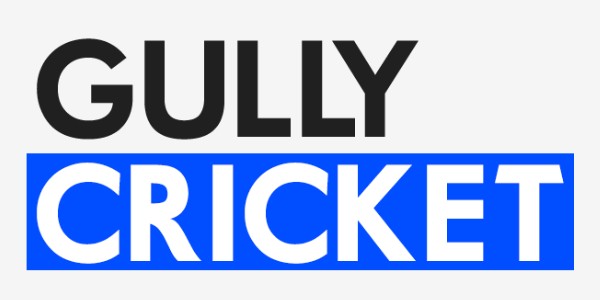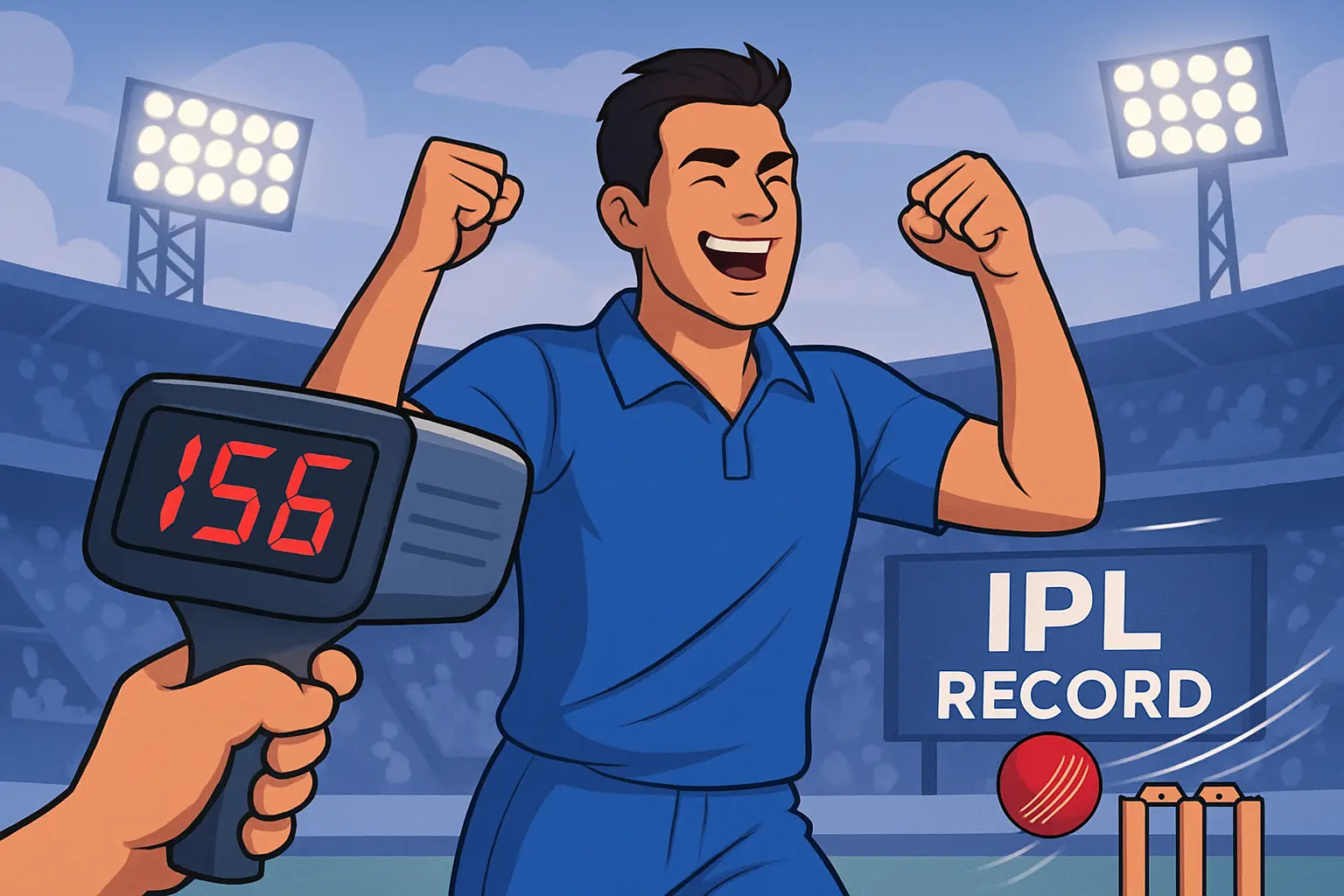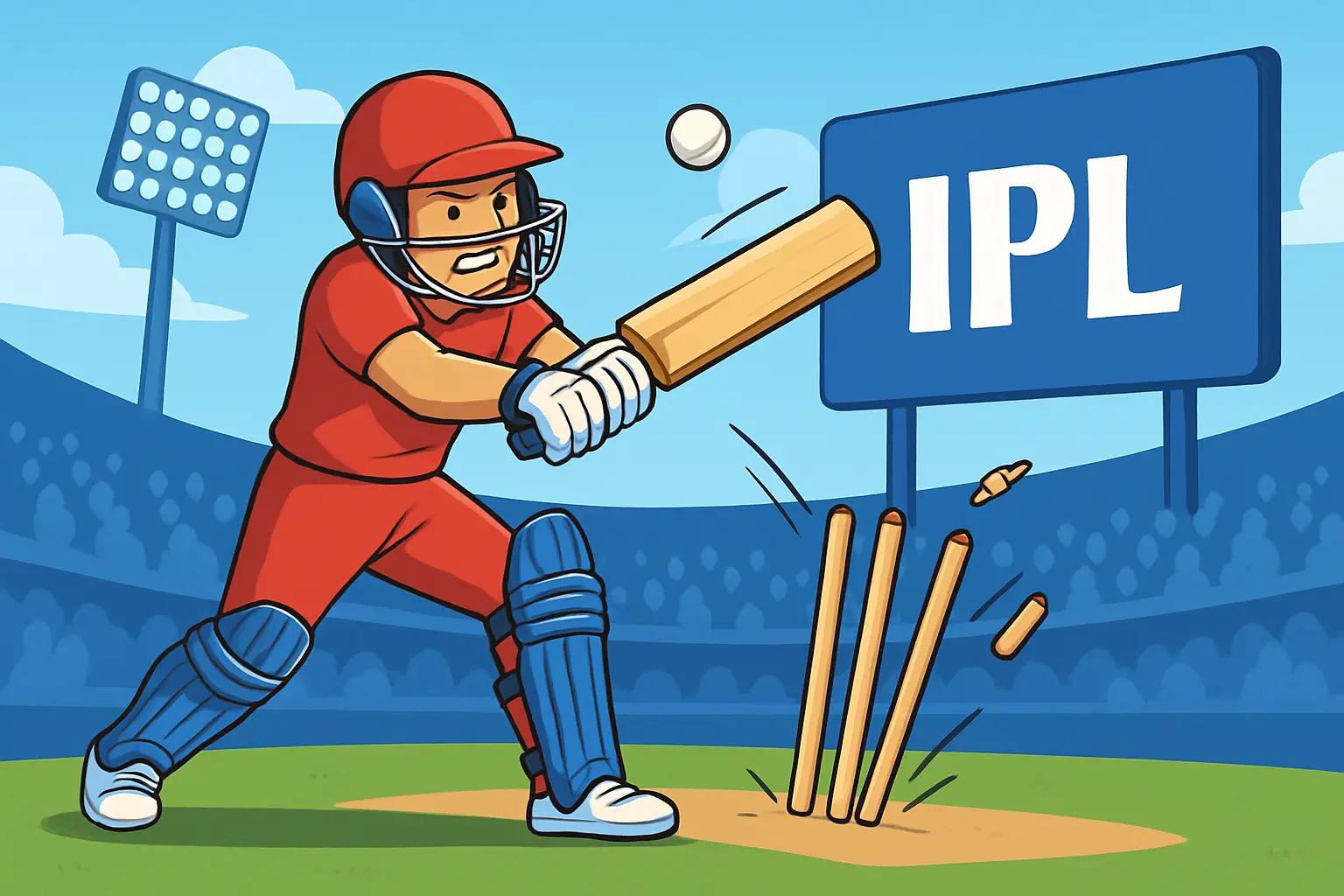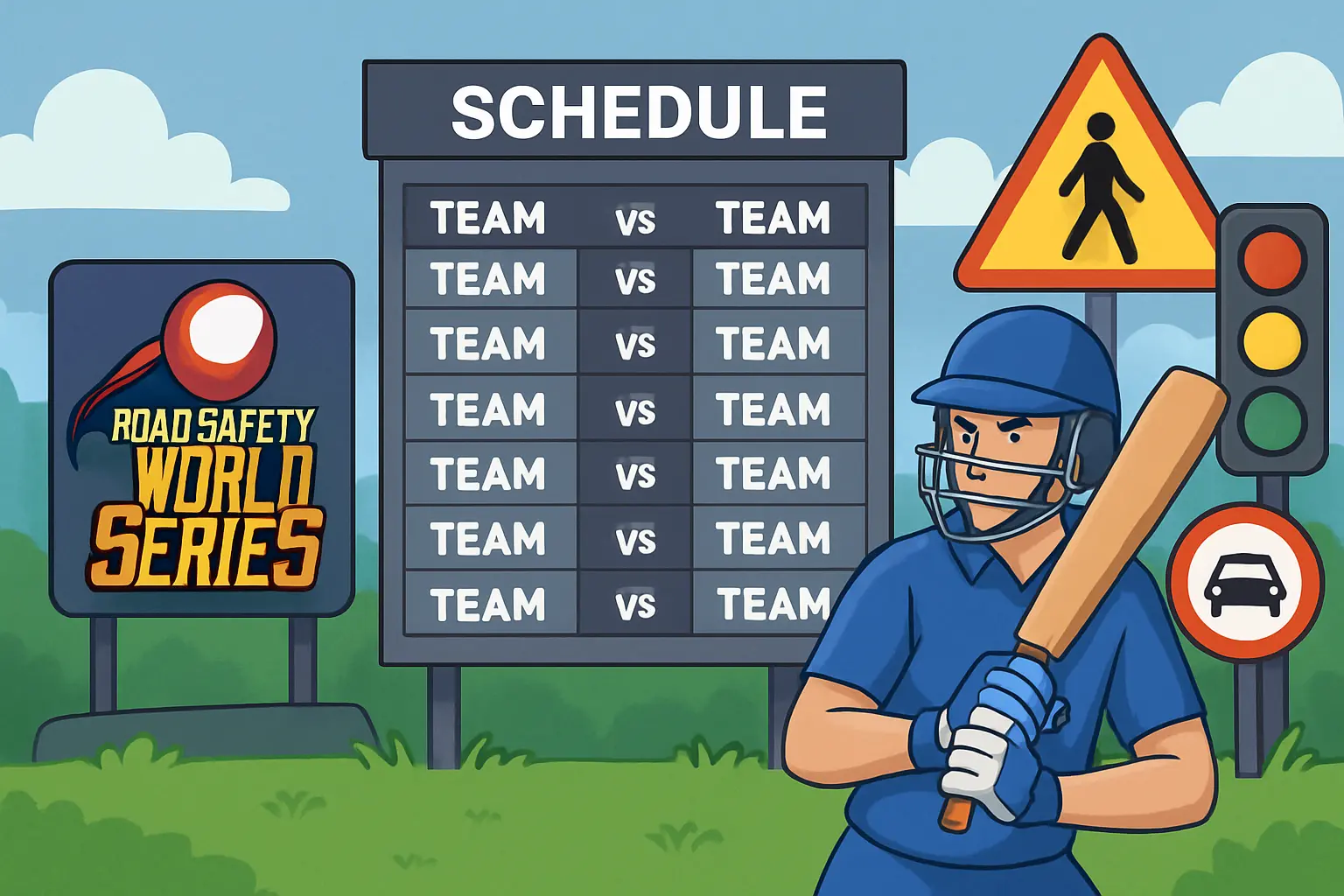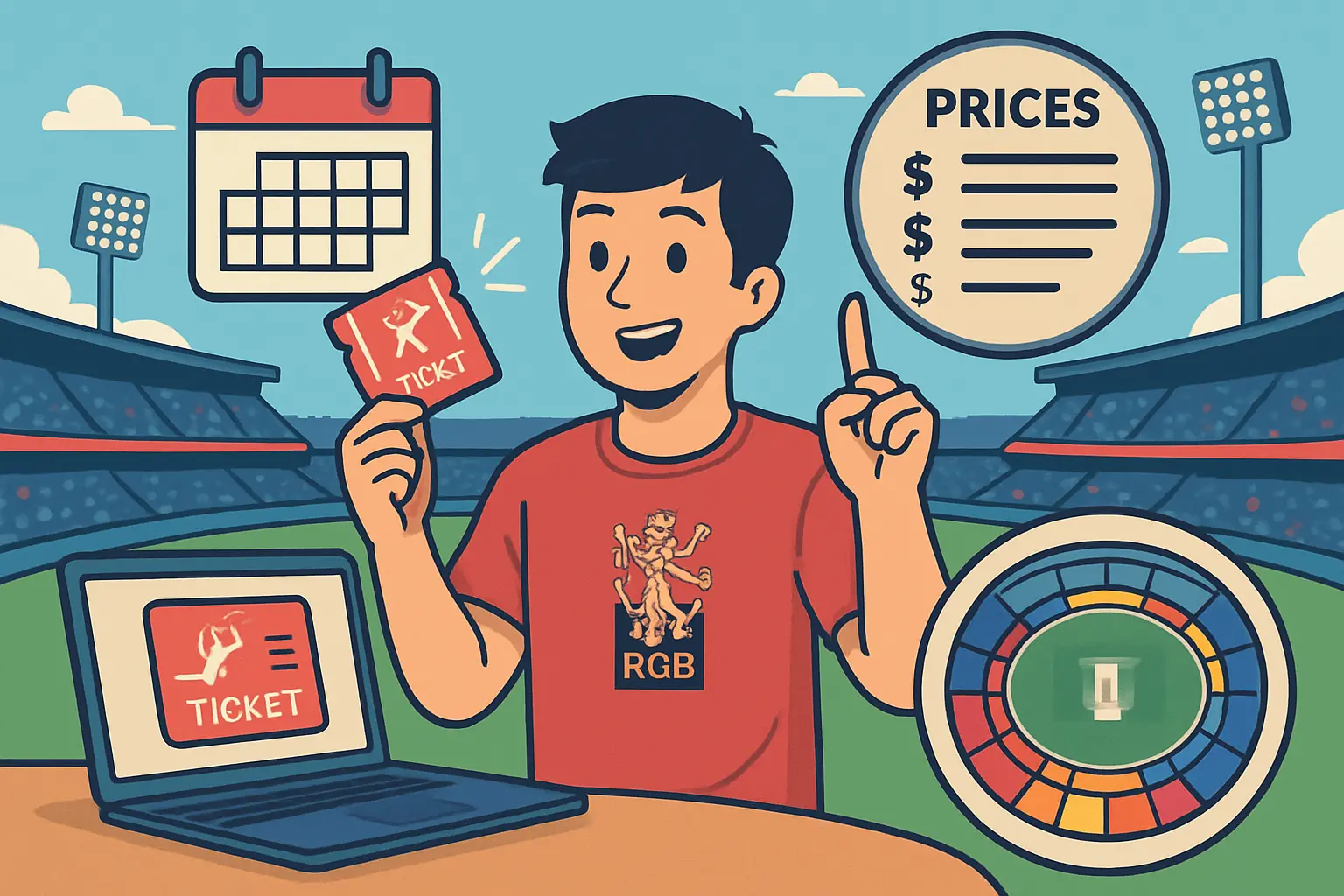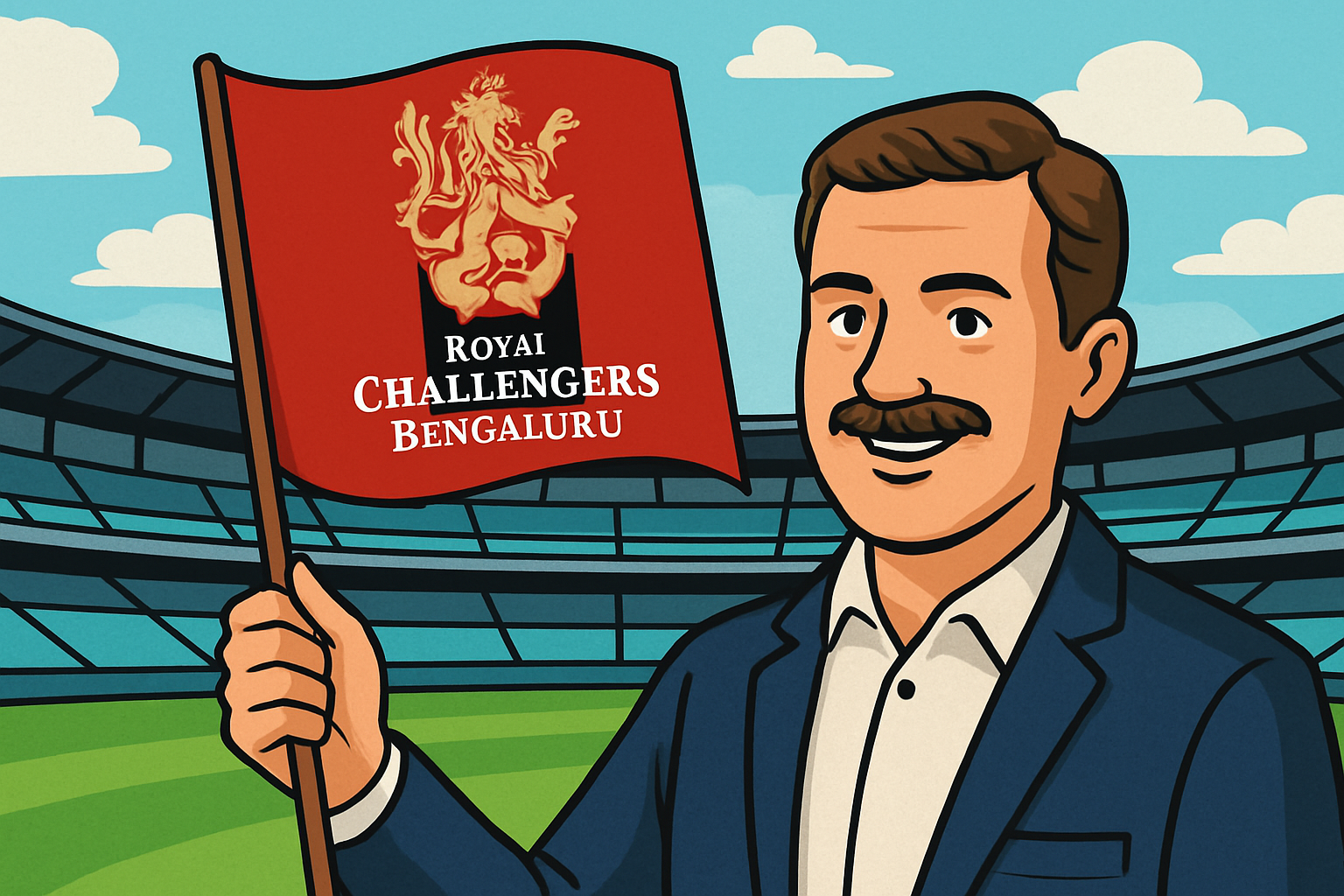
The owner of Royal Challengers Bengaluru is United Spirits Limited, part of the global spirits group Diageo. The franchise is operated through Royal Challengers Sports Private Limited, a United Spirits subsidiary.
Quick facts
- Owner of RCB: United Spirits Limited (Diageo)
- Operating company: Royal Challengers Sports Private Limited
- Franchise name: Royal Challengers Bengaluru (RCB)
- Home ground: M. Chinnaswamy Stadium, Bengaluru
- League: Indian Premier League and Women’s Premier League
- Brand connection: Named after United Spirits’ Royal Challenge whisky brand
- Leadership: The franchise is overseen by a chairman appointed by United Spirits/Diageo, with a dedicated franchise head and a cricket operations leadership team
- WPL team: Owned by the same entity; RCB Women is part of Royal Challengers Sports Private Limited
Ownership explained: the corporate structure behind RCB
RCB’s ownership is a corporate story more than a celebrity one. The franchise is a professional sports asset, held and managed through a precise chain of entities, policies, and responsibilities. That structure matters because it governs who makes decisions, where the money flows, and how the club plans its long-term identity.
Diageo and United Spirits: the parent and its Indian flagship
- Diageo is a multinational beverage alcohol company with a large portfolio of spirit brands. In India, its flagship operating company is United Spirits Limited (USL), one of the country’s largest consumer companies by sales.
- United Spirits is the legal owner of the RCB franchise rights and controls all related intellectual property through a dedicated sports subsidiary.
- In practice, that means decisions about RCB’s financial budgets, strategic initiatives, and brand direction sit within Indian management, guided by Diageo’s global governance and standards.
Royal Challengers Sports Private Limited: the operating arm
- RCB’s team operations are run by Royal Challengers Sports Private Limited (RCSPL), a wholly owned subsidiary of United Spirits.
- RCSPL is the entity that employs franchise staff, signs player contracts via the league’s systems, manages sponsorships and licensing, runs content and digital platforms, and administers matchday operations with the league and local cricket associations.
- The same subsidiary also operates the RCB Women team in the Women’s Premier League, ensuring brand consistency and centralized governance across men’s and women’s cricket.
A concise history of ownership
The franchise was originally acquired during the inaugural franchise allocation period by the then promoters of United Spirits. Over time, control of the club shifted fully into the hands of United Spirits, and through it, Diageo.
Vijay Mallya, associated with the UB Group and United Spirits during the early seasons, was publicly visible and often informally described as the “owner.” That changed as United Spirits’ control consolidated and Diageo’s governance model took over. Today, there is no personal or private individual ownership; the owner of RCB is the company, United Spirits, and the franchise is managed corporately through RCSPL.
The club evolved from a promoter-led identity to a board-governed, professionally managed sports operation. That shift explains the franchise’s current tone: more process-driven, more analytics, more long-term brand building.
Why “Royal Challengers”? The brand origin story
The name “Royal Challengers” stems from United Spirits’ Royal Challenge whisky, one of the company’s flagship brands. Early franchise branding leaned on that association to build recall. India’s advertising landscape for alcohol brands imposes restrictions; sports sponsorships are often structured under surrogate or lifestyle labels. Over time, the franchise carved out an independent identity—Play Bold, the iconic red and black kit, the Go Green match—while preserving a respectful nod to its origin.
If you’ve been around the franchise on a match week, you’ll feel that shift. Marketing moved from purely brand-led to experience-led: fan parks, content studios, e-commerce, local hospitality spaces like the RCB Bar & Cafe concept, and a steady push into community and sustainability.
RCB Bengaluru: the name aligns with the city
The transition from “Bangalore” to “Bengaluru” aligned the franchise with the official city name and the voice of its fan base. It wasn’t just a cosmetic change. In-house creatives leaned into Kannada nuances, partnerships became more local, and the club’s off-field energy mirrored the city’s growth story—tech-forward, youthful, insurgent, and collaborative.
Is RCB owned by Virat Kohli?
No. Virat Kohli has never been the owner of RCB. He is the franchise’s most enduring icon and one of its greatest players, a former captain, and a central figure in the club’s brand. But the owner of RCB is United Spirits Limited. He holds no controlling stake in the team, nor does any other player.
Think of it this way: global sports increasingly split into three clear layers—ownership, management, and team. RCB follows that model. Players are employees of the club under the league’s player contracts; management is corporate; ownership is institutional.
Leadership and management: how the franchise is run
Titles can change, but the structure is stable. The franchise follows a clear reporting line between corporate owners and cricket operations.
- Chairman: A senior United Spirits/Diageo executive serves as chairman of Royal Challengers Sports Private Limited. In recent seasons, that role has been held by Prathmesh Mishra, a Diageo India executive, reflecting the parent company’s control and governance.
- Franchise head: The day-to-day of the RCB brand and business is run by a dedicated franchise head. Rajesh V Menon has served as Vice President & Head of Royal Challengers, fronting partnerships, fan engagement, and operations across men’s and women’s teams.
- Director of Cricket (men): The men’s cricket program is led by a Director of Cricket, responsible for squad strategy, scouting, sports science integration, and auction planning. Mo Bobat—formerly a high-performance leader with the England setup—has taken on that role.
- Head coach (men): The head coach manages tactical preparation, training microcycles, and in-season adjustments. Andy Flower has coached the men’s team, bringing a fiercely analytical approach, calm bench presence, and a modern view of matchups under pressure.
- WPL cricket leadership: RCB Women is led by its own head coach and support staff integrated with the broader franchise. Smriti Mandhana has captained the side, and the WPL setup is increasingly aligned with the men’s workflows—analytics, scouting, physio, and recovery.
This is the model you see at top global franchises: corporate governance at the top, a single franchise head to own outcomes, cricket operations leadership with autonomy inside a budget, and specialized competence across scouting, data, performance, and medical.
Financial snapshot: how RCB creates value
The owner of RCB is a listed company, so the club is viewed as an asset that builds brand value, revenue streams, and long-term cash flows. RCB’s financial engine has several moving parts:
Central revenue
- Media rights share: The league’s central broadcast and digital rights pool is distributed to franchises via a formula. This is the most significant revenue stream for most teams. In strong media cycles, this line pays for a significant portion of player costs and operations.
- League-wide sponsorship share: Central sponsors on the league’s marquee inventory contribute to the shared pool.
Team-controlled revenue
- Sponsorship and partnerships: Title sponsors, principal partners, sleeve and chest inventory, training kits, digital content deals, and category-specific partners. RCB is a premium property with one of the strongest social and digital followings, translating to high partner demand. PUMA has been a long-term kit partner, a rare constant in a fast-rotating ecosystem.
- Ticketing and matchday: Gate receipts from M. Chinnaswamy home games, hospitality boxes, and premium experiences. The stadium’s capacity and the city’s cricket culture help RCB sell out often, with vibrant corporate hospitality.
- Merchandising and licensing: Jerseys, streetwear lines, fan accessories, collectibles, and co-branded experiences. RCB’s style-forward approach and content-led D2C pushes have grown steadily. You’ll see the franchise experimenting with drops, collaborations, and lifestyle products.
- Content and digital: Owned content monetization via platforms, brand integrations, and property-led series that travel through the off-season. RCB’s content teams have built one of the league’s most consistent pipelines.
- Academies and grassroots: Training programs and tie-ups expand the base, create feeder pathways, and extend brand loyalty.
Costs and profitability
- Player wages: The single biggest cost is the squad salary cap, loaded with strategic decisions. High-impact stars, a spine of domestic specialists, and matchup pieces for spin-friendly or pace-friendly conditions eat the cap differently depending on the year’s strategy.
- Support staff and performance: Coaching, analysts, physios, strength coaches, psychologists, nutritionists, and sports science investments.
- Matchday and travel: Hosting, logistics, security, accomodation, local transport, training infrastructure.
- Marketing and fan engagement: Content studios, social, digital product, events, community, and brand collaborations.
- General and administrative: Corporate overheads, compliance, and licensing.
Brand value and franchise valuation
RCB consistently sits among the top IPL brands by value. Equity analysts and brand valuation firms see three major drivers:
- Audience size and engagement: One of the largest, most global fanbases in the league, amplified by a cosmopolitan city and years of appointment-viewing matches at Chinnaswamy. The “Play Bold” ethos connects emotionally, which is priceless in a sport where tribes last a lifetime.
- Star power: From AB de Villiers and Chris Gayle to Virat Kohli and Faf du Plessis, RCB has leaned into box-office cricket. The brand influence of its stars carries beyond the season and across borders.
- Content and culture: RCB’s off-field output—documentaries, weekly series, training-room peeks, player-led segments—keeps the lights on year-round. The Go Green game has become a distinctive CSR signal, linking urban sustainability to Bengaluru’s everyday concerns.
Exact numbers fluctuate with league-wide media cycles, exchange rates, and sponsor appetites, but the trend line is clear: the owner of RCB controls an appreciating media asset with durable community value.
Sponsorship architecture: how the jersey is sold
RCB’s commercial team typically sets a tiered stack:
- Title partner: Prominent front-of-jersey exposure, integrated content, hospitality, and premium assets.
- Principal partners: Sleeve, back, training kits, training bibs, dugout positioning, and travel kits.
- Category partners: Audio, fintech, fashion, beverages, edtech, logistics, and mobility. Each brings activations across social, retail, or in-stadium.
- Official suppliers: Nutrition, recovery, technology, equipment, and travel.
The mix changes frequently. What remains stable is the clarity of the deck: meaningful integrations, high production values in content, and sharp category exclusivity.
RCB Women: same owner, new frontier
RCB Women is owned and operated by the same entity—Royal Challengers Sports Private Limited. This is not a bolt-on. It is integral to the franchise’s growth.
- Ownership and governance: United Spirits retains full control; budgets, staff, and brand guardrails mirror the men’s team.
- Cricket operations: Dedicated head coach and support staff, with shared backend facilities and analytical systems. Scouting networks overlap but are tuned to the women’s circuit—state tournaments, international series, and franchise form.
- Commercial strategy: Title and principal partners often span both teams, adjusted for men’s and women’s visibility. The combined footprint is attractive for partners seeking 12-month engagement rather than short bursts.
- Fan development: WPL matchdays at Chinnaswamy feel like a neighborhood festival—families turning up early, learners with notebooks in the East Stand, school banners, and a different decibel profile. RCB has doubled down on that identity.
Who represents RCB at the auction table?
The RCB auction table reflects the franchise’s corporate-and-cricket duality.
- Chairman or senior United Spirits executive: Owns governance and budget accountability.
- Director of Cricket: Crafts the squad blueprint, value thresholds, and real-time pivots.
- Head coach: Balances tactical fit with dressing-room chemistry.
- Lead analyst and scouting head: Control the numbers—role projections, replacement levels, injury risks.
- Team manager and finance: Ensure compliance, paperwork, and cap arithmetic.
The owner’s presence is felt through budget frameworks and risk appetite. But the cricket group calls the ball in the room. You can watch it in the micro-tells: a quiet exchange between analyst and coach before a paddle, the pause when a target crosses a pre-set threshold, the sudden pull-out when an alternative role becomes available in a later set.
RCB owner net worth, market cap, and what it really means
Search for “RCB owner net worth” and you’ll find pages trying to tie an individual’s wealth to the team. That’s the wrong frame for this franchise. The owner is a publicly listed company, United Spirits Limited, majority-controlled by Diageo. Two realities follow:
- Market capitalization, not personal net worth: The owner’s heft is treated in market cap terms—how the equity markets value United Spirits. That number fluctuates with business performance, macro conditions, and the spirits portfolio, not cricket.
- Financial firepower is governed by board policy: Player budgets must make business sense inside a multi-brand, multi-market consumer company. The club’s spend reflects strategic value, not a billionaire’s whim.
In short: RCB’s owner has deep financial capacity and global governance; the team’s budget is disciplined, long-term, and brand-conscious.
How RCB makes money: a simplified view
- Shared league revenues: Broadcast and central sponsorships.
- Team sponsorships: Title, principal, and category partners.
- Matchday: Tickets, boxes, hospitality, and in-venue sales.
- Merchandise: Jerseys, lifestyle lines, collectibles, and accessories.
- IP and content: Digital monetization, platform partnerships, and brand storytelling.
- Academies: Training programs and youth engagement.
How much does Chinnaswamy contribute?
Chinnaswamy is a jewel box for white-ball cricket—short boundaries, firm outfield, high-scoring nights, and a fanbase that swells the moment the gates open. For RCB, it means:
- Strong ticket revenue on sellout streaks.
- Premium hospitality with long waitlists.
- Sponsor-led experiences that feel organic to the city’s tech-and-design culture.
- A batter-friendly reputation that influences squad construction (powerplay hitters, death hitters, pace-off bowlers, and adaptable wrist spin).
The stadium is managed by the Karnataka State Cricket Association, and RCB works within that framework for match operations. The owner does not own the ground; instead, the franchise optimizes the home advantage commercially and tactically.
RCB ownership structure: a visual summary
- Ultimate parent: Diageo
- Indian owner: United Spirits Limited (a Diageo company)
- Operating company: Royal Challengers Sports Private Limited (subsidiary of United Spirits)
- Teams and assets: RCB (men), RCB Women, brand IP, content and merchandising, academies, hospitality concepts
- Governance: Board-appointed chairman, franchise head, cricket leadership with budget autonomy
- League interface: BCCI/league contracts, auction rules, compliance, and revenue sharing
Was RCB owned by Vijay Mallya?
Early public memory associates RCB with Vijay Mallya because he was the visible promoter of United Spirits when the franchise was introduced. Over time, governance shifted fully into United Spirits, and then into Diageo’s management model. Today, the owner of RCB is United Spirits Limited, and the franchise is professionally run. No individual controls the team.
Cultural footprint: what the owner has shaped
- A modern sports-business mindset: RCB’s front office increasingly resembles elite football and basketball teams—data science, role clarity, physio sophistication, and long-term pipelines.
- “Play Bold” as an enduring philosophy: High-risk batting, brave matchups, and the license to chase improbable totals at Chinnaswamy. The brand lives that bravery off-field too: edgy creative, ambitious partnerships, and a willingness to let players be themselves in content.
- Sustainability: The Go Green initiative is not tokenistic. The franchise has owned one game in green, pushed awareness around tree planting, and turned matchday into a soft pledge for urban change. That evolved under Diageo’s global ESG framework.
- City-first storytelling: RCB is a Bengaluru story—tech workers in their first job, coffeehouse strategists counting balls-per-boundary, schoolkids learning chants, and night rides after a last-ball finish. The owner has bankrolled that storytelling with steady budgets and smart hires.
Comparative snapshot: IPL team owners and structures
A quick context table helps frame RCB’s place in the league’s ownership landscape. This is a simplified look at principal owners and operating entities.
| Team | Owner company | Operating entity |
|---|---|---|
| RCB | United Spirits (Diageo) | Royal Challengers Sports Pvt Ltd |
| MI | Reliance Industries | Indiawin Sports Pvt Ltd |
| CSK | The India Cements group-backed entity | Chennai Super Kings Cricket Ltd |
| KKR | Knight Riders Group (Shah Rukh Khan, Juhi Chawla & Jay Mehta) | Knight Riders Sports Pvt Ltd |
| DC | JSW Group and GMR Group | JSW-GMR Cricket Pvt Ltd |
| RR | Emerging Media group-led consortium | Royal Multisport Pvt Ltd |
| SRH | Sun TV Network | Sunrisers Hyderabad Cricket Ltd |
| PBKS | KPH Dream Cricket Pvt Ltd | KPH Dream Cricket Pvt Ltd |
| GT | CVC Capital Partners | IPL Gujarat Cricket Pvt Ltd |
| LSG | RPSG Group | RPSG Sports Pvt Ltd |
Ownership shapes character. MI and CSK run like industrial powerhouses with deep legacy systems. KKR runs via a global T20 brand with stakes in multiple leagues. RCB is the classic consumer-brand franchise—marketing-first, tech-savvy, tightly produced, and community-aware.
Is RCB owned by Diageo or United Spirits?
Both answers point to the same thing, but the precise phrasing matters:
- Legal owner: United Spirits Limited is the owner of RCB’s franchise rights.
- Operating holder: Royal Challengers Sports Private Limited runs the team.
- Ultimate control: United Spirits is majority-controlled by Diageo, so the franchise ultimately sits within Diageo’s group.
When fans say “Diageo owns RCB,” they’re describing the group reality. When lawyers and journalists say “United Spirits owns RCB,” they’re describing the legal owner.
RCB Women team owner and management
- Ownership: The RCB Women team is owned by United Spirits via Royal Challengers Sports Private Limited.
- Strategy: The women’s program uses the same performance frameworks as the men—role clarity, matchup thinking, and fitness metrics adapted to the women’s game.
- Captain and coaching: Smriti Mandhana has led the side with a calm hand and clear strokeplay identity. Coaching has been handled by a dedicated head coach with international experience, supported by analysts and a medical team.
- Commercials: Sponsors often span both teams, but RCB Women is building its own base—youth-oriented campaigns, grassroots camps, and school partnerships. Matchdays have a distinctive tone, and the fan demographic skew is refreshingly balanced.
RCB owner controversies and governance hygiene
No IPL franchise exists without turbulence. Early association with promoter-era controversies forced a cleanup. The Diageo-United Spirits governance model is stricter, with clear whistleblower pathways, board oversight, and compliance teams. That has not just de-risked the franchise but given sponsors confidence to commit to multi-season deals.
A few governance pillars stand out:
- Separate legal entity for the franchise
- Board-level oversight via the chairman and United Spirits’ leadership
- Clear audit trails for player payments and vendor contracts
- Compliance with league anti-corruption and anti-doping codes
- Transparent commercial announcements and partner disclosures
Why ownership matters on the field
You can see the imprint of the owner in three ways:
- Budget discipline and squad architecture: There’s a line the club doesn’t cross for a player profile if it breaks role fit. That focus enables balanced squads and avoids headline-grabbing but ill-fitting buys.
- Investment in systems: RCB was early to build digital scouting infrastructure and use match-simulation models specific to Chinnaswamy. The “short square, thick middle” strategy—packing the middle overs with pace-off options and guarding the V with deep cover—didn’t appear out of thin air. It is modeled, iterated, and owned by the cricket operations group.
- Player support: Structured recovery cycles, mental wellness initiatives, and clarity in role communication. Players talk about how the environment lets them fail bravely without fear—an owner’s philosophy turned into daily practice.
Local vs global: is the owner Indian or UK-based?
- United Spirits is an Indian company, listed domestically, with Indian leadership and operations.
- Diageo is headquartered outside India and holds a majority stake in United Spirits, providing ultimate control and governance playbooks.
- Practically, RCB is Indian-owned and globally governed. That blend is visible in sponsorship sophistication, content polish, and operational discipline.
Royal Challenge whisky and the RCB connection
The brand link is straightforward: the team’s name nods to Royal Challenge, a United Spirits whisky. Over the seasons, RCB evolved an identity that stands on its own, independent of any single brand. That’s deliberate—alcohol advertising rules in India are strict, and the franchise is careful about family-friendly outreach and youth engagement. The legacy remains a piece of history, not a constraint.
RCB headquarters and how to reach the franchise
The franchise is headquartered in Bengaluru. Ownership and strategic decisions run through United Spirits’ corporate offices, while the day-to-day franchise staff sits within the RCSPL structure. For media, sponsorship, and community initiatives:
- Media and partnerships: Use the official Royal Challengers website and social channels; there are dedicated contact forms for partnerships and PR. The club does not publish private contact details for owners or executives.
- Fan engagement: RCB’s fan platforms and membership programs handle event access, store queries, and community activities.
Candid notes from the field: what the cameras don’t show
- Chinnaswamy on a humid night: When the dew kicks in at the death, you’ll see the analyst’s note go around—change cross-seam, pack the square, and trust fine leg. That’s not ad hoc; it’s drilled. Ownership invested in the video and data to build that muscle.
- Auction nerves: The biggest test for the “Play Bold” identity isn’t a chase; it’s walking away from a favorite when the price spills. Budget discipline is a choice made months earlier by the board, the chairman, and the DoC in a closed room with ugly scenarios pinned to a whiteboard.
- WPL learning loop: The women’s team learned quickly that the Bengaluru crowd expects fearless intent from ball one. Ownership approved extra analyst hours through the off-season to model powerplay risk in the women’s game differently from the men’s template. That openness to adapt is cultural.
FAQ: direct answers to the most searched queries
Who is the owner of RCB?
United Spirits Limited is the owner of RCB. The team is operated through Royal Challengers Sports Private Limited, a United Spirits subsidiary. United Spirits is part of Diageo.
Who is the current owner of RCB?
The owner is United Spirits Limited. No individual owns the team; it is corporately owned.
Is RCB owned by Diageo or United Spirits?
Legally, United Spirits owns RCB. United Spirits is majority-controlled by Diageo, so the franchise sits within Diageo’s group.
Who is the chairman of RCB?
The chairman’s role is held by a senior United Spirits/Diageo executive. In recent seasons, Prathmesh Mishra has been publicly identified as chairman.
Who is the CEO or head of RCB?
RCB uses the title Vice President & Head for the franchise lead. Rajesh V Menon has held that role, overseeing brand and operations.
Was RCB owned by Vijay Mallya?
In the early years, RCB was associated with the UB Group promoter and Vijay Mallya due to his role at United Spirits then. Ownership is now with United Spirits under Diageo’s governance.
Is RCB owned by Virat Kohli?
No. Virat Kohli is a player and a former captain, not an owner.
Who owns the RCB Women team?
The same owner—United Spirits via Royal Challengers Sports Private Limited.
What is RCB’s brand value?
Among the top franchises in the league. Exact figures vary by valuation firm, but RCB’s scale, star power, and digital strength keep it near the front of the pack.
How does RCB make money?
Media rights share, sponsorships, ticketing and hospitality, merchandise, content partnerships, and academies.
Who represents RCB at the auction?
The chairman or senior executive, Director of Cricket, head coach, lead analyst, and team manager/finance representative.
Who is the owner of RCB in Hindi? RCB ka malik kaun hai?
RCB ka malik United Spirits Limited hai, jo Diageo group ka हिस्सा hai. Team ko Royal Challengers Sports Private Limited operate karta hai.
Is the RCB home ground owned by the team?
No. M. Chinnaswamy Stadium is managed by the Karnataka State Cricket Association. RCB is the tenant franchise for league matches.
How to contact the RCB owner or management?
Use the official Royal Challengers website’s media/partnership forms and official social channels. Private contact details are not shared publicly.
Cementing the identity: what the owner has built in Bengaluru
RCB is a study in how corporate ownership can nurture a fiercely local identity. The red-and-black stands, the drumbeats over Cubbon Park, the skyline swallowed by a chorus on six nights—none of it is accidental. It’s investment into a city that rewards authenticity.
The franchise has kept faith with three connected ideas:
- Bengaluru first: Language, faces, partnerships, causes.
- Fearless cricket: Role clarity that allows boldness without chaos.
- Year-round storytelling: Players as people; fans as collaborators.
When you look up at the giant banners in the East Stand—legends and current heroes on the same canvas—you can trace the ownership journey too, from promoter-led flash to polished, professional, and resilient. The owner of RCB is a corporate entity. The soul of RCB remains stubbornly human.
Sources and references
- Royal Challengers official site and franchise announcements
- United Spirits Limited corporate site and investor communications
- Diageo group site and governance statements
- BCCI and league communications regarding franchise ownership and league rules
- Karnataka State Cricket Association resources on stadium operations
- Credible Indian business and sports publications reporting on RCB’s ownership, sponsorships, and management appointments
Closing thought
Ask around the stands and you’ll hear a thousand versions of the same sentiment: RCB is family. That feeling survives coaching changes, squad reshuffles, and all the noise around net worths and market caps. Ownership provides the scaffolding—the budgets, the governance, the systems. The city fills it with life. In that partnership, Bengaluru and its team have found a groove that keeps people coming back, season after season, night after night, ready to live and breathe the next great chapter.
